
The Presbyterian Church (USA), abbreviated PC(USA), is a mainline Protestant denomination in the United States. It is the largest Presbyterian denomination in the US, and known for its relatively progressive stance on doctrine and ordains women and LGBT community as elders and ministers. The PC(USA) was established by the 1983 merger of the Presbyterian Church in the United States, whose churches were located in the Southern and border states, with the United Presbyterian Church in the United States of America, whose congregations could be found in every state. The similarly named Presbyterian Church in America is a separate denomination whose congregations can also trace their history to the various schisms and mergers of Presbyterian churches in the United States. Unlike the PCA, the PC(USA) supports evangelical feminism and supports practise of same gender marriages. It also welcomes gay and lesbian persons to serve in leadership positions as ministers, deacons, elders, and trustees.
Presbyterianpolity is a method of church governance typified by the rule of assemblies of presbyters, or elders. Each local church is governed by a body of elected elders usually called the session or consistory, though other terms, such as church board, may apply. Groups of local churches are governed by a higher assembly of elders known as the presbytery or classis; presbyteries can be grouped into a synod, and presbyteries and synods nationwide often join together in a general assembly. Responsibility for conduct of church services is reserved to an ordained minister or pastor known as a teaching elder, or a minister of the word and sacrament.

The Presbyterian Church in the United States was a Protestant denomination in the Southern and border states of the United States that existed from 1861 to 1983. That year, it merged with the United Presbyterian Church in the United States of America (UPCUSA) to form the Presbyterian Church (USA).
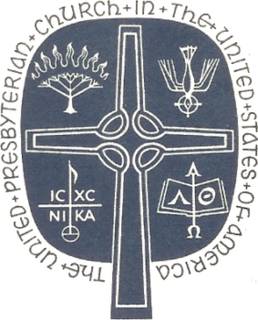
The United Presbyterian Church in the United States of America (UPCUSA) was the largest branch of Presbyterianism in the United States from May 28, 1958, to 1983. It was formed by the union of the Presbyterian Church in the United States of America (PCUSA), often referred to as the "Northern" Presbyterian Church, with the United Presbyterian Church of North America (UPCNA), a smaller church of Covenanter-Seceder tradition at a conference in downtown Pittsburgh, Pennsylvania, in May 1958. Vigorous ecumenical activity on the part of PCUSA leaders led to this merger, something of a reunion of two long-separated branches of the larger Presbyterian family deriving from the British Isles.

The Free Church of Scotland was a Scottish denomination which was formed in 1843 by a large withdrawal from the established Church of Scotland in a schism or division known as the Disruption of 1843. In 1900 the vast majority of the Free Church of Scotland joined with the United Presbyterian Church of Scotland to form the United Free Church of Scotland. The House of Lords judged that the minority continuing after the 1900 union were entitled to all the assets. While the denomination clearly had a starting date, in their own eyes their leaders had a legitimate claim to an unbroken succession of leaders going all the way back to the Apostles.

The Presbyterian Church in Canada is a Presbyterian denomination, serving in Canada under this name since 1875. The United Church of Canada claimed the right to the name from 1925 to 1939. According to the Canada 2001 Census 409,830 Canadians identify themselves as Presbyterian, that is, 1.4 per cent of the population.

The moderator of the General Assembly is the chairperson of a General Assembly, the highest court of a Presbyterian or Reformed church. Kirk sessions and presbyteries may also style the chairperson as moderator. The Oxford Dictionary states that a Moderator may be a "Presbyterian minister presiding over an ecclesiastical body".

Robert Lewis Dabney was an American Christian theologian, Southern Presbyterian pastor, Confederate States Army chaplain, and architect. He was also chief of staff and biographer to Stonewall Jackson. His biography of Jackson remains in print today.
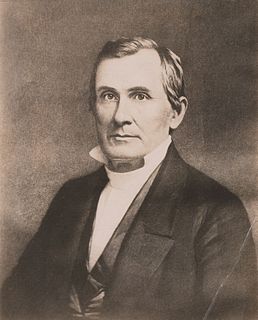
Reverend George Junkin D.D., LL.D was an American educator and Presbyterian minister who served as the first and third president of Lafayette College and later as president of Miami University and Washington College.
The Rev William Miller (1815–1874) was a Scots-born minister of the Free Presbyterian Church of Victoria who served the John Knox Church, cnr Little Lonsdale and Swanston Streets, Melbourne 1851–64, and was the first Chairman of the council of Scotch College in Melbourne.

The Old School–New School Controversy was a schism of the Presbyterian Church in the United States of America which took place in 1837 and lasted for over 20 years. The Old School, led by Charles Hodge of Princeton Theological Seminary, was much more conservative theologically and did not support the revival movement. It called for traditional Calvinist orthodoxy as outlined in the Westminster standards.
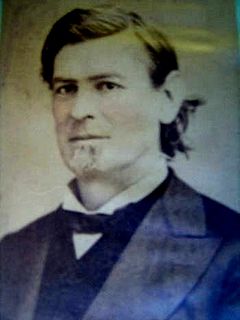
Joseph Ruggles Wilson Sr. was a prominent Presbyterian theologian and father of President Woodrow Wilson, Nashville Banner editor Joseph Ruggles Wilson Jr., and Anne E. Wilson Howe. In 1861, as pastor of the First Presbyterian Church in Augusta, Georgia, he organized the General Assembly of the newly formed the Presbyterian Church in the United States, known as the Southern Presbyterian Church, and served as its clerk for thirty-seven years.
Alexander White Pitzer (1834–1927) was an American Presbyterian clergyman. He was the author of several books on theology, and was a professor of biblical history and literature at Howard University.

James Woodrow was an uncle of United States President Woodrow Wilson, professor at Columbia Theological Seminary, and later president of the College of South Carolina. He was a controversial figure in the Presbyterian Church in the United States in the 1880s.

Thomas Jackson Crawford (1812–1875) was a Scottish minister and professor of divinity at the University of Edinburgh. He served as Moderator of the General Assembly of the Church of Scotland in 1867, the highest level within the Scottish church.
William Nixon (1803–1900) was a Scottish minister of the Free Church of Scotland who served as Moderator of the General Assembly in 1868/69. In Montrose he was nicknamed the "Lion of St John's".
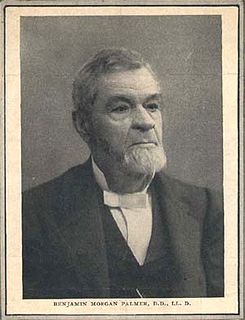
Benjamin Morgan Palmer (1818–1902) was a Presbyterian minister, theologian, in the United States. He served as first Moderator of the Presbyterian Church in the United States (PCUS) in 1861.
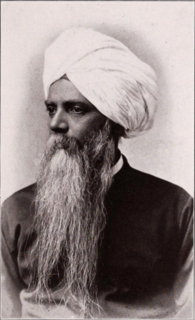
Kali Charan Chatterjee D. D. (1839–1916), also spelt as Kali Charan Chatterji or K.C. Chatterjea, was a Bengali Christian missionary who worked with the American Presbyterian Mission in Hoshiarpur, Punjab and served as the first moderator of the Presbyterian Church in India upon its formation in 1904.













